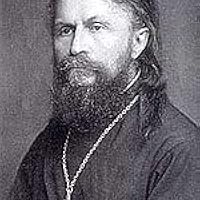Goodreads helps you follow your favorite authors. Be the first to learn about new releases!
Start by following Sergius Bulgakov.
Showing 1-14 of 14
“Of all the things people hold dear, none is necessary: not talents, not successes, not accomplishments. All these are imaginary riches for oneself. There is one fortune and joy that God grants equally to every person: one’s own life, created in God, and a heart capable of loving and of rejoicing in love.”
― Spiritual Diary
― Spiritual Diary
“There is no death: there are only two worlds, or rather one, yet for the time being it remains, for us, divided.”
― Spiritual Diary
― Spiritual Diary
“the perfect holiness of the God-Man, “the only one without sin.” Rather than “sinless,” Adam’s condition before the Fall can more accurately be called “pre-sinful.” It was sinless only in the negative sense of the absence of sin, not in the sense of the overcoming of sin. This condition of Adam is raised here to the positive holiness of the Man deified in the Incarnation,”
― The Lamb of God
― The Lamb of God
“But it is pre-eternally resolved in the bliss of the offered and mutually accepted sacrifice, of suffering overcome. This mutual sacrifice never exists unresolved, although it cannot be separated or excluded from this bliss, for it is its hidden foundation.”
― The Lamb of God
― The Lamb of God
“one cannot negate the importance of the idea itself that human will and energy preserve their autonomous being even when united with Divinity”
― The Lamb of God
― The Lamb of God
“In the Divine Spirit the relation between person and nature is defined in another manner. In the Divine Spirit, there is nothing in a given or unrealized state. This Spirit is totally and thoroughly transparent to itself.”
― The Lamb of God
― The Lamb of God
“Spiritual sonhood consists precisely in the Son’s depleting Himself in the name of the Father. Sonhood is already eternal kenosis.”
― The Lamb of God
― The Lamb of God
“Cyril of Alexandria, even more than St. Epiphanius, can present difficulties for the polemicists with the Catholics and lend support to the Filioque partisans, for it is his wont not only to call the Holy Spirit proper, idios, to the Son, in all the ambiguity of this expression, but also to speak of the origination (proeisi) of the Holy Spirit from the Father and the Son, or even from 'Both'.”
― The Comforter
― The Comforter
“In Macarius’s opinion, all the statements of Christ contained in the Gospels should be attributed to one person, to the one incarnate hypostasis of the Word, for “both the human and the divine [statements] were spoken by one person.”
― The Lamb of God
― The Lamb of God
“creaturely freedom, which, being limited, is expressed in the opposition of freedom — as volition — to necessity, which is freedom’s limit, condition, and object.”
― The Lamb of God
― The Lamb of God
“You”
― Spiritual Diary
― Spiritual Diary
“the Divine hypostases are equally eternal. The Father is the cause (aitia) of the Son not in the sense of His origination but only of eternal interrelation: that of begetter and begotten, the revealing one and the revealed one, the subject and the predicate.”
― The Lamb of God
― The Lamb of God
“And He is near also to you”
― Spiritual Diary
― Spiritual Diary
“The Holy Spirit proceeds from the Father and is received by the Son; He is the “third” person of the Holy Trinity, for He establishes the mutuality of the Father and the Son. God ideally defines His own nature in this begetting of His Pre-eternal Word by the Speaking Father. But the reality of this nature is experienced through the Holy Spirit. In God there is no self-definition that is not hypostatic. Therefore, the recognition of His own nature as reality is the hypostatic act of the procession of the Holy Spirit.”
― The Lamb of God
― The Lamb of God





